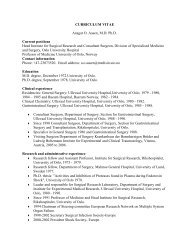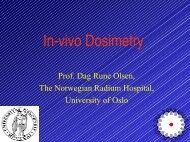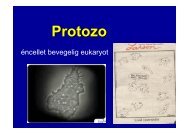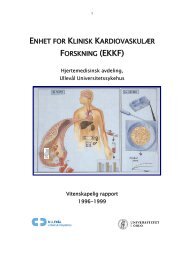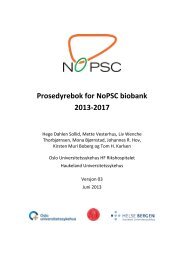Novel genetic and epigenetic alterations in ... - Ous-research.no
Novel genetic and epigenetic alterations in ... - Ous-research.no
Novel genetic and epigenetic alterations in ... - Ous-research.no
Create successful ePaper yourself
Turn your PDF publications into a flip-book with our unique Google optimized e-Paper software.
Discussionchromosomes <strong>in</strong> metaphase[189], <strong>and</strong> loss of expression has been shown to cause G2/Marrest[190]. Indels <strong>in</strong> the 5’UTR region of this gene, a site of major translational regulation,may affect translational efficiency <strong>and</strong> stability, lead<strong>in</strong>g to cancer cell arrest <strong>and</strong> reducedproliferation. K<strong>no</strong>ck<strong>in</strong>g out RCC2 therefore seems like a bad strategy for a cancer cell, <strong>and</strong>one would expect a strong negative selection pressure. Still, we see a mutation frequencyabove 50%, <strong>in</strong>dicat<strong>in</strong>g that this is <strong>no</strong>t the case.Figure 15. Study sizesanalyz<strong>in</strong>g cod<strong>in</strong>g repetitiveunits <strong>in</strong> MSI-tumors. Allstudies <strong>in</strong>cluded <strong>in</strong> the reviewfrom 2007[90] are <strong>in</strong>cluded.Sample size <strong>and</strong> number ofgenes analyzed are plottedaga<strong>in</strong>st each other. Moststudies analyze a small numberof samples for a restrictednumber of genes. The star<strong>in</strong>dicates the size of the studypresented <strong>in</strong> paper IV.Predictive markersWhile some biomarkers are well suited for diag<strong>no</strong>stic purposes, others can be used todeterm<strong>in</strong>e, or predict, response to a certa<strong>in</strong> therapy. Such markers are called predictivemarkers. In paper III we showed that mutations <strong>in</strong> KRAS <strong>and</strong> BRAF were common <strong>in</strong> CRCas they were present <strong>in</strong> 62% of the tumors. Mutations <strong>in</strong> these genes have <strong>in</strong> other studiesbeen shown to predict response to cetuximab, a mo<strong>no</strong>clonal antibody therapy target<strong>in</strong>g theepidermal growth factor receptor (EGFR). About 30-40% of <strong>no</strong>n-responders to this therapycarry a KRAS mutation. Mutations <strong>in</strong> BRAF is significantly associated with lack of treatmentresponse as <strong>no</strong>ne of the patients with BRAF mut responded, while <strong>no</strong>ne of the responders58





